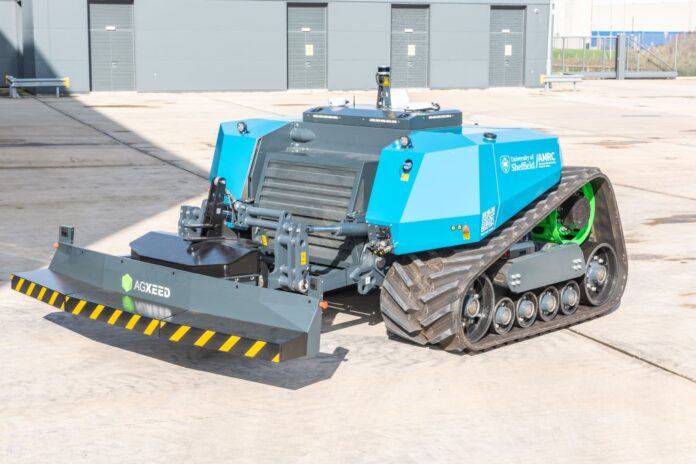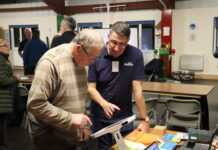
AMRC Cymru has taken delivery of the UK’s first commercially available fully-autonomous tractor – enabling the research centre to plough new ground in the agriculture industry and will be showcased during Wales Tech Week.
The AgBot has been designed to create a smaller, lighter and more efficient tractor unit, which can run non-stop and unsupervised for up to 23 hours. Saving not only time, it can also enable farmers to plan ahead with daily operations in order to help them drive forward their sustainability footprint, improve farming precision and provide traceability data to support vital business decisions.
Wales Tech Week, taking place at the International Convention Centre in Newport, has been created as a diverse, inclusive, sustainable summit to connect and create opportunities for some of the most innovative, creative and forward-thinking people and businesses in Tech.
Andy Silcox, research director at AMRC Cymru, part of the University of Sheffield, said: “AMRC Cymru are delighted to be at Wales Tech Week as it gives the opportunity to showcase the support the AMRC and the wider High Value Manufacturing (HVM) Catapult, which we are part of, provides companies to help them exploit digital and automation tools to become more productive and sustainable.
“Although we have a clear manufacturing focus, this support for digitalisation and automation has relevance to other sectors, so Wales Tech Week will also be the first public appearance of our Agbot which shows how these same principles cross over into the agricultural sector.”
Harry Collins, senior manufacturing research engineer at AMRC Cymru, said the AgBot is important to agriculture as it has many advantages, including complete autonomy, allowing it to be operated unmanned for a great length of time, helping to fill gaps in current labour shortages. It also has a lower weight in comparison to a traditional tractor and provides less ground pressure and soil compaction.
“The idea behind it is being able to put the AgBot in a field and set it off running with tasks via a phone, laptop or tablet,” said Harry.
“If it encounters a medium risk, such as coming into contact with a tall weed, the online system sends you a notification outlining the problem and provides a list of options of how to fix it and quickly allows you to set it back off again. Or if it comes across a major risk, including someone standing in front of it, the tractor automatically comes to a stop – and in that scenario, the individual will need to physically go out and address the problem.”
Andrew Martin, head of food and drink at AMRC Cymru, said the impact of this new agri-tech plays an important role to help the research facility be at the forefront of agricultural change within Wales.
“AMRC Cymru is leading the way in driving forward agri-tech solutions in Wales by conducting a landscape review,” Andrew added. “The review is helping us to understand how we can aid Wales in achieving a reduction in emissions within the farming and food supply chain, as the UK pushes for a zero carbon supply chain within the agriculture industry.
“We hope such an investment will help the UK drive forward the next global rural/industrial revolution in green growth, through new technology deployment. It will also help us to develop research in global climate change, advance capabilities and new relationships – we are already being proactive in developing international partnerships across Wales, Canada and Japan.”
AMRC Cymru has led in the development of new technologies, using digital twins and robotics within the food and drink sector. Engineers are now using this business-focused research to develop new areas of horizontal innovation from food and drink into the agriculture supply chain.
Harry said the landscape view of the sector came about at the research facility, after engineers had listened to the farming community about what needed change – and that this new technology would help aid and de-risk future investments by the farming community.
“Purchasing this new technology shows the public and the farming community that we are serious about investing in the latest equipment and having the opportunity to test it in order to help farming adapt for the future,” Harry added.
“I think there is a massive unknown in the market with the significant reviews being undertaken by Governments and a lot of changes are coming. “It is unclear what the future holds for farming, around the latest agri-tech, but it’s great to be in a position to be able to test the equipment, do research in this area and be ready for the change when it comes, so we can help the farming community in Wales that will be most affected.”
Currently, an AgBot costs about 75 per cent more than a conventional tractor, but could provide long-term savings in terms of fuel consumption, labour costs and has the capacity to switch out its diesel generator for the potential of future greener non-fossil fuels, such as hydrogen. This could drive forward a different view of how sustainability should be considered within the farming environment.
It has the standard three-point linkage, meaning the tools and equipment hitched on the front and back are compatible with those currently available in farming, can tackle adverse weather conditions and run for almost a full day before the need to refuel. In addition, it is able to plot out the most efficient route on the field, which takes into account headlands and navigating predefined obstacles such as trees – all of this is done through an online portal of the farm and mapped field.
The AgBot, which costs around £380,000, was funded through a £1.5m capital purchase grant that AMRC Cymru secured from the Welsh Government. The funds are being used to buy multiple pieces of equipment to help enhance the research facility’s capabilities and use on future collaborative research projects.
Harry has a pivotal role to play in the centre’s agri-tech research, bringing with him a wealth of experience in design and manufacturing engineering, as well as being involved in agricultural design.
He also revealed how the AMRC Cymru’s new work in agriculture brings about a personal connection – Harry enjoys sheep farming as a hobby and has a small holding with 90 acres of land and is home to a small flock of commercial sheep, as well as a group of pedigree sheep.
“I think it’s great to work on things in your professional career that you are passionate about and interested in away from the day job,” he added.
“I am excited to work with the AgBot and intrigued to see what comes out of it. There’s also plans to present this capability at a number of roadshows over the coming months.
“We are still ironing out our plans in terms of future project work and how this agri-tech comes in through our landscape review.
But we have signed a memorandum of understanding (MoU) with Coleg Glynllifon (Grwp Llandrillo Menai), and our plan is to use the AgBot on its farm. That is going to provide us with a great test window and help us get lots of data as to how successful it is with varying parts of the Welsh landscape.”
AMRC Cymru is actively looking for new partners within the agricultural sector. If you are interested, please email enquiries to wales-enquiries@sheffield.ac.uk.
Help keep news FREE for our readers
Supporting your local community newspaper/online news outlet is crucial now more than ever. If you believe in independent journalism, then consider making a valuable contribution by making a one-time or monthly donation. We operate in rural areas where providing unbiased news can be challenging. Read More About Supporting The West Wales Chronicle
























